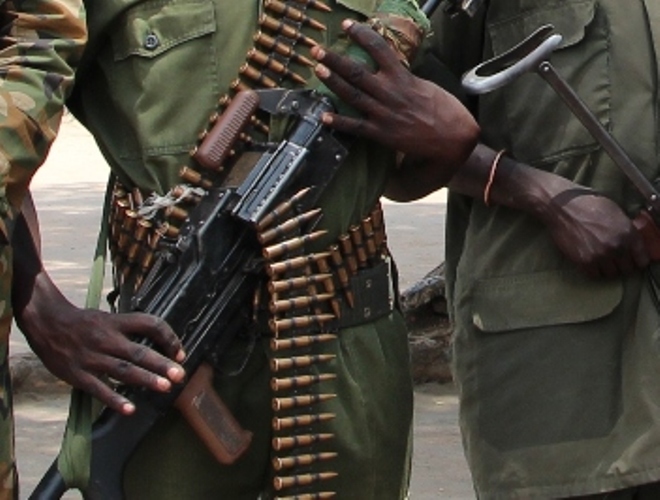
Thursday, November 05, 2015

Arms and light weapons have been used by both warring parties in South Sudan to commit abuses (Photo courtesy of SSANSA)
advertisements
The two main rivalsagreement Sudanese conflict are expanding stockpiles of weapons and ammunition in violation of the internationally-backed regional peace deal, United Nations experts told the Security Council Wednesday."The UN experts, Reuters reported, said they examined the flow of arms into South Sudan and had "credible, independent" reports that both the Juba government and armed opposition forces were boosting their supplies.
The revelation came during a consultative meeting, held at the request of the United States, on South Sudan.
The meeting also discussed how the UN mission in South Sudan staffs can be protected in the wake of the recent abduction and release of 18 of its workers by the armed opposition in Upper Nile state.
The 15-member Security Council had warned in August it was ready to impose an arms embargo on the country should the peace accord fail to work.
Political differences between president Salva Kiir and his ex-deputy Riek Machar triggered a violent conflict in the country in December 2013 and reopened ethnic fault lines between Kiir’s Dinka and Machar’s Nuer people in which over 10,000 people were killed.
Both Kiir and Machar signed the peace deal in August. The two sides have since accused each other of continued attacks, in violation of a permanently signed ceasefire deal.
In recent weeks, however, several aid agencies have expressed concerns over the lack of access to those in need especially in Upper Nile region.
The experts, according to Reuters, said both sides were "persistently failing to implement a permanent ceasefire and failing to agree meaningfully to security arrangements that are requisite for the establishment of the transitional national government."
They also said Kiir had taken steps to "undermine the power-sharing formula" that underpins the peace deal by planning to increase the number of states in South Sudan to 28 from 10. The presidential decree is due to come into effect by mid-November.
"South Sudan has a long history of violent disputes over internal border demarcation," the experts wrote, adding, "Implementation of the decree and the consequent discussion over the exact borders as well as competition over new governorships may inject new drivers of conflict into the ongoing civil war".
The government, the experts said, continues to target civilians in oil-producing Unity state, citing reports of gross human rights violations on mainly women and children.
Despite, the Security Council blacklisting six rival generals in South Sudan, Russia, Angola and Venezuela objected in September to a United States bid to add the nation’s army chief and a rebel commander to the sanctions lists.
Meanwhile, the Security Council is expected to be heavily engaged on South Sudan issues in the coming weeks. By 23 November, the Council reportedly expects to receive from the Secretariat a report with an assessment and recommendations on how the mission can best be structured and resourced to support implementation of the peace deal.